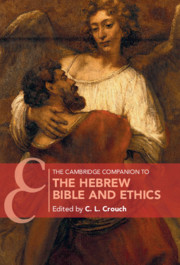Book contents
- The Cambridge Companion to the Hebrew Bible and Ethics
- Cambridge Companions to Religion
- The Cambridge Companion to the Hebrew Bible and Ethics
- Copyright page
- Dedication
- Contents
- Notes on Contributors
- Introduction
- Part I Legal Ethics
- 1 The Decalogue
- 2 The Talionic Principle and Its Calibrations
- 3 Community Violence in Deuteronomy
- 4 The Construction of Gender Roles in the Book of the Covenant and in Deuteronomy
- 5 Economics and the Law
- Part II Narrative Ethics
- Part III Prophetic Ethics
- Part IV Wisdom/Poetic Ethics
- Part V Faithful Ethics
- Index
- Cambridge Companions to Religion (continued from page iii)
- References
4 - The Construction of Gender Roles in the Book of the Covenant and in Deuteronomy
from Part I - Legal Ethics
Published online by Cambridge University Press: 05 February 2021
- The Cambridge Companion to the Hebrew Bible and Ethics
- Cambridge Companions to Religion
- The Cambridge Companion to the Hebrew Bible and Ethics
- Copyright page
- Dedication
- Contents
- Notes on Contributors
- Introduction
- Part I Legal Ethics
- 1 The Decalogue
- 2 The Talionic Principle and Its Calibrations
- 3 Community Violence in Deuteronomy
- 4 The Construction of Gender Roles in the Book of the Covenant and in Deuteronomy
- 5 Economics and the Law
- Part II Narrative Ethics
- Part III Prophetic Ethics
- Part IV Wisdom/Poetic Ethics
- Part V Faithful Ethics
- Index
- Cambridge Companions to Religion (continued from page iii)
- References
Summary
As a very new Hebrew Bible professor working on my dissertation on Deuteronomic family law, I once attended a reception for the great New Testament scholar Krister Stendahl. Someone briefed him well; when he was introduced to me, he murmured, “Women in Deuteronomic law. Not much joy!” Bishop Stendahl’s assessment was on target. An analysis of gender norms and biblical law sheds light on the gender ideals and aspirations of certain elite circles of ancient Judahite men, but it does not render an ethical model for folk today. It is, nonetheless, worth undertaking – if only to avoid uncritically passing on abhorrent values. After discussing the nature of biblical legal texts and a brief look at gender and the Decalogue, this essay focuses on how the Covenant Code (C; Exod 20:22–23:33) and Deuteronomic law (D; Deut 12–26) construct gender roles. Analysis of the construction of gender norms in the priestly laws remains for another time.
- Type
- Chapter
- Information
- The Cambridge Companion to the Hebrew Bible and Ethics , pp. 51 - 67Publisher: Cambridge University PressPrint publication year: 2021



